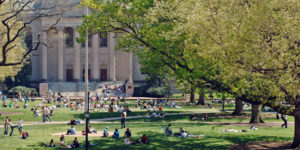by WorldTribune Staff, May 1, 2017
The North Carolina state House in late April passed a bill aimed at fortifying free speech at the 16 schools in the University of North Carolina system.
House Bill 527: Restore/Preserve Campus Free Speech, which has a companion bill in the Senate, requires that state public universities maintain “the fullest degree of intellectual freedom and free expression.”

The bill would require universities to teach students about free speech during freshman orientation, and enforces penalties on protesters who block campus events.
The bill passed by an 88-32 vote with all 74 Republicans in favor. Only 14 Democrats voted for the bill.
Supporters of H.B. 527 based their arguments on a recent report from the Foundation for Individual Rights in Education (FIRE), a nonpartisan research and litigation organization which found that 15 out of 16 UNC schools violated speech rights in some form, Carolina Journal reported on May 1.
In 2016, FIRE rated 449 public and private higher-education institutions nationwide in three categories: red light, yellow light, and green light. Red- and yellow-light schools enforce unconstitutional policies that violate or abuse open speech. Green-light schools uphold First Amendment rights.
When H.B. 527 passed, only one UNC campus, Chapel Hill, ranked as a green-light school. Eleven others were ranked yellow, and the remaining four were designated red.
According to the Carolina Journal report, Democrats challenged the validity of FIRE’s study. During an April meeting of the House Committee on Education-Universities, Democrats asked why, if campus speech policies are so constrictive, more people hadn’t complained.
Speech violations, while not widely publicized, are very real, said Anna Beavon Gravely, state director for Generation Opportunity, a nonpartisan millennial group. Gravely added that many students fear speaking out because they don’t want to jeopardize their academic standing.
“People feel like this is a solution in search of a problem. … In reality this is a problem that has been glossed over for so long it’s to the point that students are not in touch with what free speech actually is,” Gravely said. “Like going to campus and thinking that you can’t speak about issues you care about unless you’re in a specific space [on campus.]”
N.C. State scrapped its permit code for noncommercial speech after a lawsuit was filed by the Grace Christian Life campus organization.
In 2015, administrators targeted the organization as it distributed pamphlets and talked to students on campus, the group’s president, Hannalee Alrutz, said.
“Two of our members walked up to a student and asked if they could pray for the student. We pray for students. We also draw out a diagram of how you can get to know God through Jesus Christ’s sacrifice,” Alrutz told Carolina Journal.
An administrator interrupted and said the group’s members were breaking an N.C. State policy. Under university code, the group needed a campus permit for almost any type of noncommercial communication.
“We were shocked because we had never heard of such a policy,” Alrutz said. “We didn’t really know which one it was. It put fear into the hearts of a lot of students in the organization.”
In April 2016, Alrutz and her group decided to sue. During a preliminary injunction in June 2016, the U.S. District Court for the Eastern District of North Carolina issued a stay against N.C. State’s permit code for noncommercial speech.
In July, the university settled the lawsuit, paying $72,500 to cover Grace Christian Life’s legal fees.
Alrutz said some university speech policies often carry unintended consequences.
N.C. State’s speech policy was a nonissue until it was aimed at Grace Christian Life, she said.
“Everyone could be affected depending at the time on who is using the policy. … We all have viewpoints, and we all have opinions, so if there’s an arbitrary policy, it’s going to be used unjustly.”
